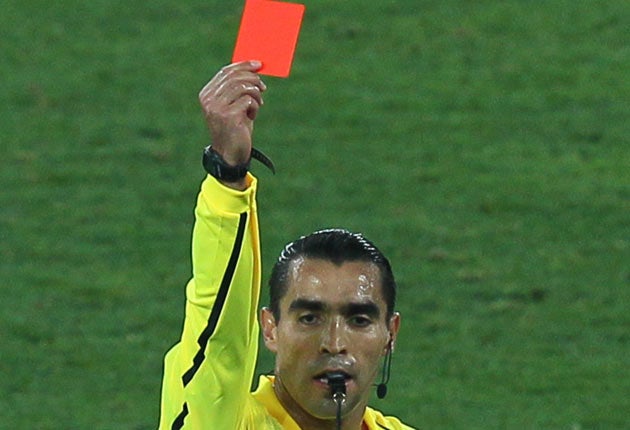Robert Chalmers doesn't like... referees

In most areas of human endeavour, it's a general truth that, even if you can't empathise, you can at least understand. What would persuade anybody to pursue an occupation that invites ridicule, loathing, and humiliation? In recent years, referees have been stripped naked on the pitch (Stelious Rinious, in a Greek domestic fixture) stoned to death (the Peruvian, Felipe Compinez) and shot dead, in Africa, Asia and South America.
Ego, according to sportswriter Hugh McIlvanney, is a factor. "The ambition to referee at the top level," he told me, "can partly be explained as a desire for a dramatic role in a big event. One characteristic they often share is a pronounced thespian streak. In the lower leagues, you get these little park-keeper types, who try to boss everybody around, then have to flee."
Referees' personal conduct has not always met the standards they demand of others. Bizarrely, as I write this, the sixth most viewed story on the BBC news website is a link to footage of then Fifa referee Sergei Schmolik staggering around during a game in Belarus, in 2008. The source of his confusion emerged after police relieved him of his whistle, and had him breathe into a device with even more fearsome disciplinary consequences than his Acme Thunderer.
Schmolik isn't alone in having disgraced the Fifa badge. In September 1999, the Russian Sergei Khusainov flew to Israel with assistants, to referee a Uefa Cup game in Haifa. According to Moscow newspaper Kommersandt, the officials disembarked in high spirits. Having "sung several songs" and "done a dance," one attempted to fondle the buttocks of an Israeli policewoman. Later, at a restaurant, Mr Khusainov, having been refused more alcohol, stood on his chair and declared: "I love Jews and I can guarantee you a favourable result tomorrow."
The officials, Kommersandt continues, "molested waitresses, then went outside and began directing traffic". Replacements arrived from Bucharest.
In South Africa, that same year, a dispute between referee Lebogang Mokgethis, and Isaac Mkhwetha of Wallabies FC, ended when the referee shot him. English officials, though unlikely to pack a handgun, are no strangers to the rush of blood. I have one cutting describing a game in north London, in which the referee reportedly appeared for the second half wielding a felling axe, and approached the players, shouting: "Do any of you f****** want some?"
These are isolated lapses which shouldn't detract from the pivotal question concerning referees, namely: can we trust them?
Internationally, the most shocking aspect of the practice of bribing officials has been its routine nature. The late Spaniard Emilio Guraceta threw a game in Anderlecht's favour, in 1984, for $27,000. In 1996 Swiss schoolmaster Kurt Roethlisberger – according to Russ Williams' definitive Football Babylon "visited Grasshoppers of Zurich, asking whether they would be interested in favourable decisions. The sum of £50,000 was mentioned." But the most shameful episode in mainland Europe's inglorious past occurred in 1973, when the Portuguese official, Francisco Lobo, recorded a call in which Juventus offered him a bribe of $5,000. He handed the tapes to Uefa. No sanction was imposed. and Lobo's career never flourished.
These are historic examples; contemporary scandals remain fresh in the memory of Portugal and Italy. Last month, five years after the shameful calciopoli scandal involving Juventus, Milan and others, 16 men were arrested on suspicion of match-fixing. Assuming that bribery has been eliminated in Europe is a bit like believing a spouse who's been unfaithful 399 times and promises that, from now on, things will be different. Not so long ago I had a conversation with an executive at a British club who expressed grave misgivings about the refereeing in a European game, over which no action was taken.
In the Premier League, the consensus is that incompetence, not corruption, is the enemy; there's been no suggestion that a British referee has ever taken bribes. That said, how much sympathy can you have for officials who complain of abuse when (this was a wired-for-sound David Elleray, addressed by Arsenal's Tony Adams) they allow themselves to be called a "f***ing cheat"? Or tolerate finger-wagging dissent without showing a yellow? Or retreat from an aggrieved player when, if they stood their ground, the flurry of 16-match bans would soon eliminate the habit?
And when will our officials insist on a strategy that might seriously discourage bribery, verbal abuse and simulation: the introduction of microphones and video technology? It's the one development that might finally earn referees a measure of that virtue they so frequently plead for, yet so rarely inspire: respect.
Subscribe to Independent Premium to bookmark this article
Want to bookmark your favourite articles and stories to read or reference later? Start your Independent Premium subscription today.

Join our commenting forum
Join thought-provoking conversations, follow other Independent readers and see their replies